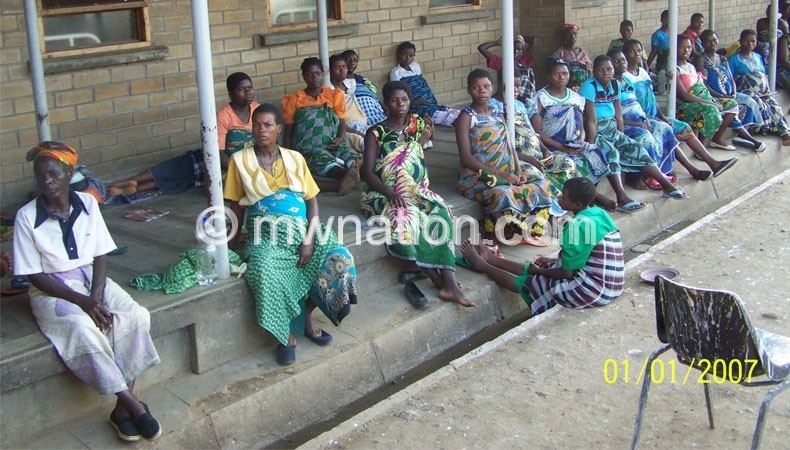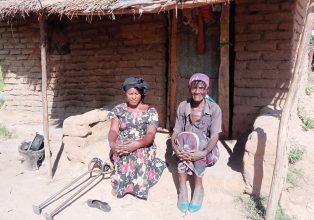Tackling Covid infodemic
Malita Chizombe, from South Lunzu in Blantyre, is in the last trimester of her pregnancy.
She and her husband are expecting their third child.

Visibly, hope is rising as they are counting down to the arrival of a new addition to the family. Even the two children, one aged eight years and the other five, cannot wait to see and hold their little sibling.
Although the Chizombes are looking forward to welcoming a new life, there is a life-saving requirement the mother is not doing.
The 37-year old has not attended antenatal clinic for three months, fearing to contract coronavirus at the clinic.
This is unlike how she prepared himself for safe delivery when she was carrying the pregnancies of her other two children.
The only thing that has changed since she last gave birth is the emergence of the Covid-19 pandemic discovered in Wuhan, China in December 2019.
Due to her religious beliefs and the myths flying around concerning the pandemic, Malita and her husband have decided not to go to hospital anymore. This contradicts government guidelines which require pregnant women to attend medical checkups for safe motherhood.
Despite her stance, she appreciates the possible danger she and the unborn child face.
“It is a choice we made. We would rather stay here at home than go there and be exposed to things that we are not aware of. With the grace of God, I know my baby will be safe,” Malita said.
She is not the only one staying away from hospital because of the Covid-19 misconceptions and the fear of contracting the disease in a hospital setting.
As we are told by traditional leaders and health workers during our visit in some townships around Blantyre, the virus has dealt a terrible blow to health-seeking behaviour.
Group Village Mwamadi of Bangwe Township says many patients are refusing to go to hospital to receive treatment for various ailments, which are not related to Covid-19.
She said: “Some of the stories we are hearing are unbelievable. Some are saying that whenever someone dies at the hospital, health workers will just say: ‘this one died of Covid-19.’ There is a belief that health workers are receiving fat allowances for treating Covid-19 cases, so they are inflating the figures by deliberately injecting them with coronavirus to get more money.”
Mwamadi said community leaders are engaging people to dispel the myths and misconceptions, but, some doubters are still adamant.
So rampant are the myths that some are refusing to get Covid-19 vaccines because they believe that the jab is a ploy of the devil and the West to wipe out Africans, she states.
“The problem is that they are denying themselves a chance to receive treatment for curable ailments which are somehow getting worse. We are trying our best, but it has not been easy,” Mwamadi says.
The growing fear and resistance to go to hospital has left health facilities in Blantyre, Zomba Mzuzu and Lilongwe, with reduced patients.
Eunice Kayira, a health surveillance assistant at Bangwe Health Centre, says the growing apathy needs a cautious response as it is touching on very sensitive matters.
She explains: “When we ask some patients why they suffer in silence at home, they say Covid-19 is a ploy to reduce population in Africa.
“The few that are having the courage to come are refusing to receive any injection. This is fuelled by the wide circulation of fake news on the social media.”
The community health worker hopes that government through the Ministry of Health will train its workforce to deal with the situation.
“We are the ones who deal with the people in the communities and we understand how their minds work. It is just unfortunate that we have not been engaged at any level to equip us fully for this task,” she said.
The Catholic Commission Justice for Peace (CCJP) is running a project to ramp up maternal and newborn health services in some districts amid the Covid-19 emergency.
According to project coordinator Louisa Kwapata, the initiative seeks to ensure that there is continued access to health services, especially for pregnant women and newborn babies amid Covid-19.
“The project is engaging both women and men as key players in the equation,” she said. “We want to increase access of sexual reproductive health services and new born information, while debunking some myths founded on the prevalence of Covid-19.
The initiative has unearthed and debunked deep-rooted myths and stereotypes, including men who think that sexual and reproductive health issues is exclusively a woman’s issue.
In Kwapata’s words, their effort seems to be paying off gradually.
Recently, there has been a marked change in attitude by some communities.
But for the Chizombe and others, maybe they may need a little more convincing to change their stance. This calls for intensified civic education to dispel devastating myths slowing the race for safe motherhood amid Covid-19.





One Comment